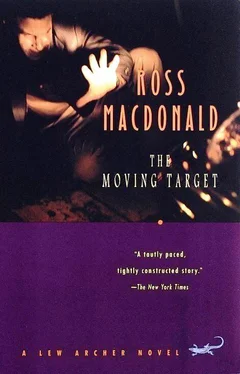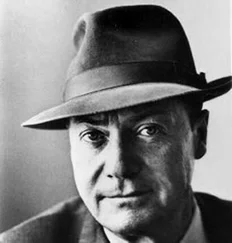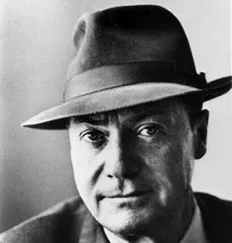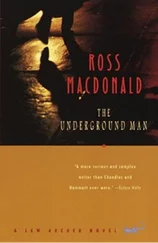She inclined toward me. Her breasts leaned out from her body, vulnerable and soft. Her mouth was soft. “I don’t know how to begin. What shall I do?”
“Come with me.”
“With you? You want me to go with you?”
“Don’t try to shift your weight to me, Miranda. You’re a lovely girl, and I like you very much, but you’re not my baby. Come with me, and we’ll talk to the D. A. Well let him decide.”
“Very well. We’ll go to Humphreys. He’s always been close to Albert.”
She drove me up a winding road to the mesa that overlooked the city. When she stopped in front of Humphreys’ redwood bungalow, another car was standing in the drive.
“That’s Albert’s car,” she said. “Please go in alone. I don’t want to see him.”
I left her in the car and climbed the stone steps to the terrace. Humphreys opened the door before I could reach the knocker. His face was more than ever like a skull’s.
He stepped out on the terrace and closed the door behind him. “Graves is here,” he said. “He came a few minutes ago. He told me he murdered Sampson.”
“What are you going to do?”
“I’ve called the sheriff. He’s on his way over.” He ran his fingers through his thinning hair. His gestures, like his voice, were light and distant, as if reality had moved back out of his reach. “This is a tragic thing. I believed that Albert Graves was a good man.”
“Crime often spreads out like that,” I said. “It’s epidemic. You’ve seen it happen before.”
“Not to one of my friends.” He was silent for a moment. “Bert was talking about Kierkegaard just a minute ago. He quoted something about innocence, that it’s like standing on the edge of a deep gulf. You can’t look down into the gulf without losing your innocence. Once you’ve looked, you’re guilty. Bert said that he looked down, that he was guilty before he murdered Sampson.”
“He’s still being easy on himself,” I said. “He wasn’t looking down; he was looking up. Up to the houses in the hills where the big money lives. He was going to be big himself for a change, with a quarter of Sampson’s millions.”
Humphreys answered slowly: “I don’t know. He never cared for money very much. He still doesn’t, I don’t think. But something happened to him. He hated Sampson, but so did lots of others. Sampson made anyone who worked for him feel like a valet. But it was something deeper than that in Graves. He’d worked hard all his life, and the whole thing suddenly went sour. It lost its meaning for him. There was no more virtue or justice, in him or in the world. That’s why he gave up prosecuting, you know.”
“I didn’t know.”
“Finally he struck out blindly at the world and killed a man.”
“Not blindly. Very shrewdly.”
“Very blindly,” Humphreys said. “I’ve never seen a man so miserable as Bert Graves is now.”
I went back to Miranda. “Graves is here. You weren’t entirely wrong about him. He decided to do the right thing.”
“Confessed?”
“He was too honest to bluff it through. If nobody had suspected him, he might have. Anyone’s honesty has its conditions. But he knew that I knew. He went to Humphreys and told his story.”
“I’m glad he did.” She denied this a moment later by the sounds she made. Deep shaking sobs bowed her over the wheel.
I lifted her over, and drove myself. As we rolled down the hill, I could see all the lights of the city. They didn’t seem quite real. The stars and the house lights were firefly gleams, sparks of cold fire suspended in the black void. The real thing in my world was the girl beside me, warm and shuddering and lost.
I could have put my arms around her and taken her over. She was that lost, that vulnerable. But if I had, she’d have hated me in a week. In six months I might have hated Miranda. I kept my hands to myself and let her lick her wounds. She used my shoulder to cry on as she would have used anyone’s.
Her crying was settling down to a steady rhythm, rocking itself to sleep. The sheriff’s radio car passed us at the foot of the hill and turned up toward the house where Graves was waiting.
The End
Ross MACDONALD was born near San Francisco in 1915. He was educated in Canadian schools, traveled widely in Europe, and acquired advanced degrees and a Phi Beta Kappa key at the University of Michigan. In 1938 he married a Canadian girl who is now well known as the novelist Margaret Millar. Mr. Macdonald (Kenneth Millar in private life) taught school and later college, and served as Communications Officer aboard an escort carrier in the Pacific. For over twenty years he has lived in Santa Barbara and written mystery novels about the fascinating and changing society of his native state. Among his leading interests are conservation and politics. He is a past president of the Mystery Writers of America. In 1964, his novel The Chill was given a Silver Dagger award by the Crime Writers’ Association of Great Britain. Mr. Macdonald’s The Far Side of the Dollar was named the best crime novel of 1965 by the same organization. And The Moving Target was made into the highly successful movie Harper (1966).












